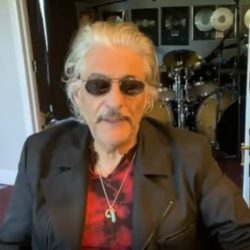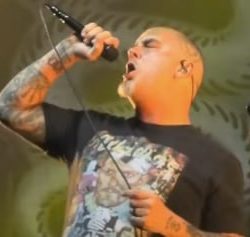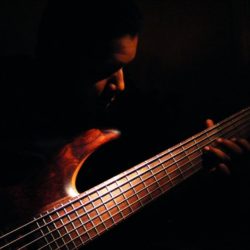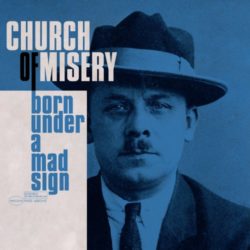
How to tell the difference between add chords and altered guitar chords
Here are five chords with names to test the brain and a sound that’s kind to the ear. Add them to your chord vocabulary now
Read more »
CARMINE APPICE Rails Against Being Called 'Washed Up': 'I Don't Look Like I'm Dead, Unlike A Lot Of Guys My Age'
By David E. Gehlke
Legendary drummer Carmine Appice says he only spoke the truth when he spilled the dirt on guitarist Mick Mars’s departure from MÖTLEY CRÜE. In doing so, he generated some nice free press ahead of his new instrumental rock album with Cuban guitarist Fernando Perdomo, “Running Up Th…

Dave Mustaine explains why “it's not really that hard to shred fast” and what makes his Gibson and Epiphone models impossible to tell apart
The Megadeth leader shares how working with Gibson is “the greatest thing that’s ever happened” in his career, the “massive piece of the puzzle” that makes a good guitarist, and why he “unfairly” poked fun at Kirk Hammett
Read more »
Guitarists on TikTok are wrapping rubber bands around their strings – here’s why
Hint: it’s a cheap, less invasive version of a hugely popular indie guitar mod
Read more »
Taylor CEO Andy Powers has launched his own electric guitar company – and his first model looks like an absolute winner
The acoustic craftsman has gone electric to create a guitar with “a sound and feel that didn’t already exist”
Read more »
Watch PANTERA Perform At Poland's METAL HAMMER FESTIVAL
Fan-filmed video of PANTERA’s June 5 performance at the Metal Hammer Festival at Atlas Arena in Łódź, Poland can be seen below.
The band’s setlist was as follows:
01. A New Level
02. Mouth For War
03. Strength Beyond Strength
04. Becoming
05. I’m Broken
06. Suicide Note Pt. II
07. 5 Minutes Alone
08…

JUAN CROUCIER: 'RATT Took A Lot Of Pride In Being A Really Good Live Band'
In a new interview with Thomas S. Orwat, Jr. of Rock Interview Series, RATT bassist Juan Croucier spoke about “The Atlantic Years: 1984-1991”, a new limited-edition box set from BMG, in partnership with Rhino Entertainment, celebrating RATT’s massively successful period where all five of their studi…
Read more »
Watch: MAMMOTH WVH Performs At Gothenburg, Sweden's Ullevi Stadium As Support Act For METALLICA
MAMMOTH WVH, the project led by Wolfgang Van Halen, the ex-bassist of the band VAN HALEN and son of the late guitarist Eddie Van Halen, performed on Friday (June 16) at the Ullevi stadium in Gothenburg, Sweden as the support act for METALLICA. Fan-filmed video of the performance can be seen below.
M…

A Q&A with Bass Virtuoso Rich Brown
One of my favorite bassists is also the one person on earth that I have the most bass gigs in common with. He has played in more bands that I have also played in than anybody else, and most of these bands—from Dapp Theory to Rudresh Mahanthappa to Steve Coleman—were not easy situations to step into. However, in every single case, I have listened to him and thought, “Damn … he sounds great!”Rich Brown is an all-around bass virtuoso who is everybody’s first call across the Canadian border. I had the great honor of chatting with Rich recently. This interview features excerpts from that conversation:When did you first start playing music, and in particular, when and why did you take up the bass?I took guitar lessons when I was around eight, and I dreaded going to those lessons every single week. But my dear mom urged me to keep at it. She would make me practice for 15 minutes before I could go outside and play with the other kids. My interest in the guitar waned until one day at the age of 13 when I turned the TV on and saw a video on MTV called “Unchained” by Van Halen. When I saw how much fun those guys were having on stage and realized how good the music made me feel, I knew I wanted to be a musician. I taught myself to play by listening to Van Halen, Hendrix, Stevie Ray Vaughan, and Mark Knopfler. But years later, in high school, I found that there were a million guitar players and zero bass players. So I made the switch thinking, “How hard can it be to play bass?” The answer was, VERY!I started by playing along with albums by the Police, and I would spend my days playing along to the songs on the radio, most of which were simple pop tunes. One night when I was 17, I tuned into a jazz program that had announced that a bass player named Jaco Pastorius had just died. I had never heard of Jaco, and the two hours that followed completely changed my life. The first song they played was “Continuum,” and by the end, I realized there was a higher level of musicality on the bass. So, I made it my mission to get to that level, and to this day, I’m still on that mission.We are all the sum of our influences. I’ve found that learning from as many sources as possible makes me a more multifaceted player. Jaco has been a common denominator for many bass interviews! Almost everybody has had a Jaco moment. However, you don’t just sound like Jaco. What are some experiences that contributed to you developing your own sound?One of my first important musical experiences was playing in a Rush cover band in high school. I had so much fun working with those different rhythmic cycles. It was my introduction into playing so-called “odd-time” signatures. But I live in Toronto. A city that the UN once recognized as the most multicultural city in the world. I’ve been blessed with many incredible opportunities to work with amazing musicians from disparate parts of the globe. Over the years, these experiences helped to shape my sound and broaden my perspective as a bass player. One of the most formative experiences has to be my time with Dapp Theory, led by pianist and composer Andy Milne. I was very inexperienced when I joined, and I learned a lot about my tone and the various bass sounds required to play that music. I had to get a good slap tone together and a solid, well-defined bass tone with enough warmth in the high register for melodic solos. Just having those three sounds available to me on one instrument allowed me to feel comfortable within any project. How did all that exposure prepare you for some of the musical situations that you play in today?I feel like certain aspects of my playing have truly benefited from working with musicians of different cultural backgrounds. I got into bands that played a lot of Brazilian and West African music back in the ’90s. Playing with those projects taught me a great deal about time, groove, note placement, and note length. I also worked with bands that played Egyptian, Turkish, and South Asian music. With those groups, I learned a lot about melody and note ornamentation. There are beautiful melodic inflections unique to each of those cultures that floor me to this day. These inflections are subtle but deeply effective, and I try to learn and incorporate them as much as I can. We are all the sum of our influences. I’ve found that learning from as many sources as possible makes me a more multifaceted player. Gaining a deeper understanding of the different styles around the world gives me some new insights into my approach to all forms of Western music.YouTube ItThere’s a wealth of content on Rich’s YouTube page, but his cover of Floating Points and Pharaoh Sanders’ “Promises” on an 18″ bass might be the most eye-catching.
Read more »
ALBUM REVIEW: Born Under A Mad Sign – Church Of Misery
After seven years and a blistering set at Desertfest London in which the Electric Ballroom was laid to waste, the time has come for CHURCH OF MISERY to deliver new…
Read more »